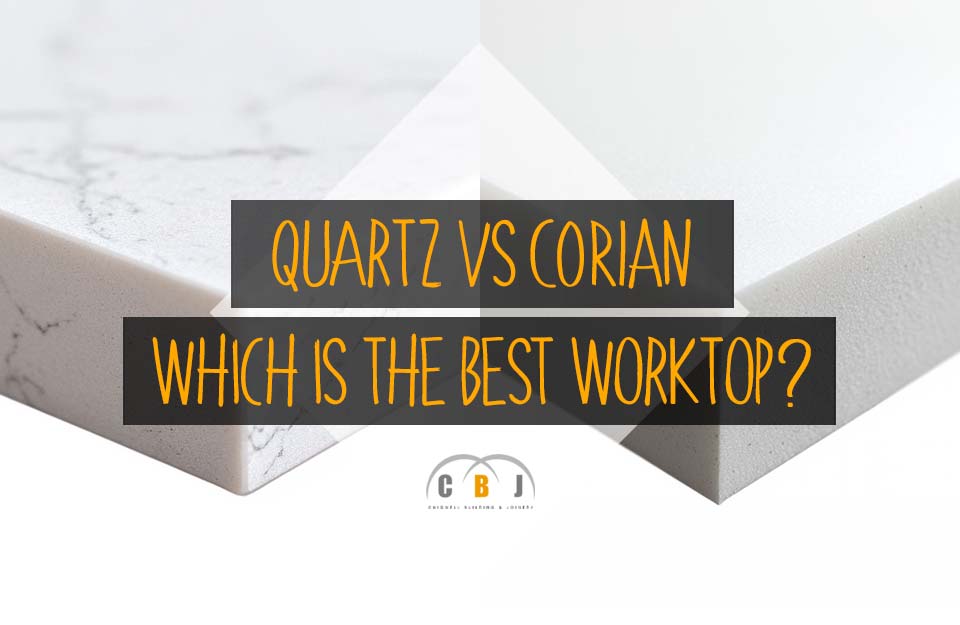News
Quartz vs Corian - Which is the Best Worktop?
Author Chigwell Building & Joinery
Date 01/12/2024
When deciding what material to choose for kitchen countertops, there are numerous options on the market, as well as several factors to take into account.
Quartz and Corian are very popular options.
They are both made from natural minerals and binding resins, offering attractive, high quality, durable options.
However there are certain differences worth considering between the two.
Table of Contents
- What is Corian?
- What is Quartz?
- Key Differences Between Quartz and Corian
- Origin
- Appearance
- Imperfections
- Durability
- Stain Resistance
- Mark and Scratch Resistance
- Maintenance and Care
- Heat Resistance
- Strength
- Longevity
- Water Resistance
- Design
- Installation
- Cost
- Conclusion
What is Corian?
Corian® solid surface worktops have become very popular for kitchens.
The brand name has become synonymous with work surfaces as this solid, non-porous material offers numerous advantages.
These worktops are manufactured by DuPont, and are made from engineered stone.
Initially Corian used to be available only in white, but since its inception as far back as 1967, it can now be found in over 100 different colours.
Corian is composed of 66% natural bauxite minerals, and 33% acrylic resins and colour pigments.
These materials are blended and compressed under very high temperatures in order to form slabs of varying thicknesses and colours.
The surface of Corian looks very natural, however while it has the natural beauty and luxurious look of granite and marble, there are no imperfections or fissures whatsoever.
In fact, Corian work surfaces have a consistent colour and pattern throughout the entire slab.
Since it is a non-porous material, it is also very hygienic.
Another advantage of Corian is that it can be joined seamlessly, hence offering a neat look since splash-backs and up-stands appear to be moulded to the countertops.
Corian is also non-toxic and hypoallergenic.
With improved technology in its manufacturing it does not yellow over time, and it is available in a wide range of colours and effects.
What is Quartz?
Quartz is a man-made material widely used for kitchen worktops.
It is made from composite engineered stone whereby natural quartz crystals are bonded with silica, polymers and acrylic resins.
They are compressed at a very high temperature in a process called vibro-compaction, so as to ultimately produce quartz.
Quartz countertops are usually made with 90-95% quartz minerals and 5-10% resin and pigments.
The latter leads to a huge range of colours and patterns being created.
In fact the range of colour and pattern in which quartz is available is very broad and diverse.
Just like Corian, Quartz is a non-porous and hygienic material.
It is also very durable and hard-wearing.
One of the main reasons why quartz is such a popular material is that it is extremely hard and resilient without requiring much effort when it comes to cleaning and maintenance.
Key Differences Between Quartz and Corian
While both Quartz and Corian are known for being premium quality worktops, they vary in a number of aspects:
Origin
Both Quartz and Corian are made from engineered stone.
They comprise natural minerals combined with acrylic binding resins, using very high temperatures.
Colour pigments are incorporated in order to become part of the material, leading to a consistent colour throughout the slab.
Corian was created by DuPont scientists back in 1967.
Thicknesses of Corian slabs are usually in 6mm, 12mm and 19mm.
The surface of Corian derives from bauxite ore, which is a type of sedimentary rock that is both durable and reliable.
Quartz started being used for kitchen worktops around the same time.
It was in 1963 that Italian inventor Marcello Toncelli came up with a method for engineering quartz that he then patented.
Other companies followed suit over the years, with similar compositions to manufacture quartz slabs.
Appearance
Both Quartz and Corian are premium quality, luxurious looking materials.
Quartz contains crystals and as a result it has a unique lustre.
Corian on the other hand appears to be quite similar to marble or granite as it contains speckling.
Their appearance is something that many buyers love because apart from being available in many colours and patterns, both of these materials have that deluxe and rather opulent look which is favoured by many.
Imperfections
Many people prefer countertop materials where no imperfections are evident.
When it comes to natural stone such as granite or marble, natural imperfections are common.
There may be fissures and cracks too.
However with Corian and Quartz, imperfections are not a problem at all as they offer a smooth and consistent appearance throughout.
Durability
Quartz is one of the hardest minerals in the world.
It is very resilient and able to withstand heavy traffic, wear and tear that is common for kitchen worktops.
It is very scratch resistant, and considerably heat resistant too.
Corian is also a durable material, and it can handle constant and heavy usage very well.
However if you were to compare it with quartz, one can say that the latter is somewhat more durable.
Stain Resistance
Since both materials are non-porous, they are highly resistant to stains as well as germs.
There is also no need to seal Quartz or Corian, demonstrating how highly stain resistant both of them are, especially if one were to compare them with other materials used for countertops such as granite.
Mark and Scratch Resistance
The scratch resistance of the material is a key aspect to consider when deciding what material to opt for kitchen worktops.
Quartz is much more resistant to scratches and other marks than Corian since it is harder.
In fact Corian is more easily scratched, and the darker the colour is the more visible the damage will be.
Having said that, at least Corian can be repaired fairly easily as it can be sanded and polished.
Maintenance and Care
Both materials fare very well in terms of their longevity.
Repairs are not something one should worry about as if they are properly cared for, they will literally last a lifetime.
However, Corian is more flexible.
It can be sanded out, polished and hence being easier to repair than quartz would be.
Indeed, only minor repairs can be carried out on quartz.
Little maintenance and care is required for both Quartz and Corian.
Simple regular cleaning with warm, soapy water will suffice to keep them clean with very little effort.
After wiping with soapy water, just rinse and dry the surface and it will remain in tip top shape.
No need for abrasive cleaners or sponges, or special cleaners.
Heat Resistance
Heat resistance is an important aspect to consider.
Quartz fares better than Corian in terms of heat resistance.
In fact it can withstand higher temperatures than Corian.
However, it is important to avoid exposing quartz countertops to very high heat as prolonged exposure can lead to damage.
One can say that Corian is quite heat resistant.
Due to its thermoforming properties it can be moulded in any shape.
Consequently it is important to avoid leaving hot pans on a Corian worktop as there is a high probability of damaging it.
Strength
Both Quartz and Corian are very durable and strong materials.
However if you were to compare them to each other, Quartz is harder than Corian.
Consequently it is less prone to dents and scratches.
Having said that, Corian is still hard and strong, but it has the advantage of offering more flexibility since it can be thermoformed, sanded, shaped, rounded and engraved.
Such actions would not be possible with quartz.
Longevity
Both materials are highly durable, and if properly cared for they will last a lifetime.
The best thing is that neither Corian or Quartz require any special cleaning or a great deal of effort when it comes to maintenance.
Both of them will stand the test of time without much effort on your part.
Water Resistance
Both Quartz and Corian are non porous materials.
Corian is made with a very high ratio of resin, making it completely non-porous, and thus very resistant to stains.
It does not require a sealant.
Moreover, since there are no crevices it is highly hygienic and resistant to bacteria.
Quartz is not completely nonporous but its water resistance is also very good and in fact it does not need to be sealed, unlike other stone surfaces.
Design
Corian is very versatile.
It comes in over 100 colours nowadays, and it can be engraved and thermoformed.
Quartz offers great customisation options too.
The elegant look that both Corian and Quartz offer is something that many homeowners aspire for their kitchens.
Since both materials come in a large variety of colours, patterns and finishes, they are ideal for any preference one may have.
Installation
Installing Corian or Quartz is definitely a job best left in the hands of a professional company.
Besides being heavy to handle, such materials will need to be measured and cut precisely, and installed perfectly on the countertops.
Considering the costs involved to purchase them, as well as the tools that would be required for installation, it definitely makes sense to hire a professional to handle the installation to ensure perfect results.
Cost
Quartz is slightly more expensive than Corian.
This tends to be the case with darker colours.
Indeed, Corian is more affordable than Quartz, which is why it has gained in popularity since its introduction to the market.
Even though both of these materials call for a considerable expense, they offer very good value for money.
One will be making a good investment when opting for either one of them for kitchen countertops.
Conclusion
Choosing between these two beautiful materials may not be that simple as they are both very good options for kitchen countertops.
While Corian is more versatile and available in a vast range of colours and patterns, many feel that quartz is more unique in terms of its appearance.
Moreover, quartz is relatively more durable and fares better in terms of its scratch resistance.
If you intend to place more importance on the appearance and durability factors, then quartz may be the best option.
However if you are set on a specific colour scheme, you may wish to opt for Corian.


